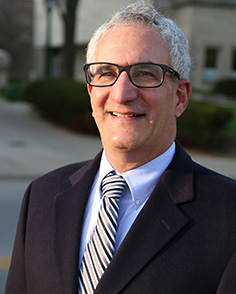About Robert M. Nosofsky
Professor Nosofsky received a B.A. from the State University of New York at Binghamton in 1978 (psychology and mathematics) and a Ph.D. from Harvard in 1984 (cognitive psychology). He joined the faculty at Indiana University in 1984 and became Chancellor's Professor in 2003. He was awarded Distinguished Professor in 2006.
Professor Nosofsky does research in the field of human cognition. He has developed a formal theory of how people represent categories in memory and how people make classification decisions. The theory also explains relations between categorization and other fundamental cognitive processes, such as recognition memory, individual object identification, and the development of automaticity in tasks of skilled performance. His research approach combines formal mathematical and computer-simulation modeling with empirical work on classification learning, memory, similarity-scaling methods, and response time.
Professor Nosofsky was elected to the Society of Experimental Psychologists in 1998 and elected president of the Society for Mathematical Psychology in 1996. He served as associate editor of the Journal of Experimental Psychology: Learning, Memory, and Cognition from 1993-1994 and as associate editor of Psychonomic Bulletin & Review from 2001-2005. He also served as a panel member for the National Science Foundation from 1992-1996 and for the National Institutes of Mental Health from 1998-2002.
Professor Nosofsky received the Distinguished Faculty Member Award from the College of Arts and Sciences in 1998. He received the APA Distinguished Scientific Award for an Early Career Contribution to Psychology in 1993, and the Troland Research Award from the National Academy of Sciences in 1995.
Nosofsky received the IU Bicentennial Medal in September 2020 in recognition of his distinguished contributions to Indiana University.


